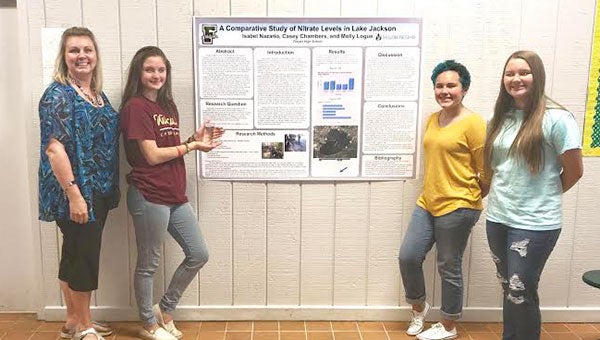Project: Lake Jackson levels clean
Published 12:00 am Tuesday, May 14, 2019

- Jennie Ward, Molly Logue, Isabel Nazario and Casey Chambers in front of their award-winning poster.
Three Florala High School eighth graders recently conducted a Lake Jackson water quality project that won them best overall project in the GLOBE Southeast Regional Student Research Symposium in Atlanta last weekend and won best overall project. Their results also showed the lake is clean and safe.
The Global Learning and Observations to Benefit the Environment (GLOBE) Program is an international science and education program that provides students and the public worldwide with the opportunity to participate in data collection and the scientific process, and contribute meaningfully to the understanding of the Earth system and global environment.
“Through the Alabama Math, Science and Technology Initiative, I was trained to use GLOBE protocols,” group sponsor Jennie Ward said. “At the symposium there were four categories and then an overall winner and we were the overall winner.”
The girls decided to test the water quality at Lake Jackson in Florala, something that has not been done since 2004.
“Our hypothesis was that there would a lot more plants where the nitrate levels would be higher,” Eighth grader Isabel Nazario said. “And we were correct about that. We also found that the nitrate levels were extremely low in the water and the water is extremely safe, clean and there is no risk right now for anything to increase.”
Ward said that there has been talk that there is a lot of fecal matter in the water at Lake Jackson, so this project was done to clear the air.
“Our big issue was finding out if there really was fecal matter in the water,” Ward said. “We were concerned that either sewer leaks or people using the bathroom in the lake or animals, because the community has constantly raised concerns about that. Nitrate is an excellent indicator, because if that nitrate level was high then that nitrate would have to come from fecal matter that was breaking down in the water. The average nitrate level was 0.08, and the EPA allowed amount is 10. So, you could pretty much drink the water in the lake.”
Ward said that the entire project was student led.
“The only thing that I was there for was to lead them in the right direction,” Ward said. “I had to teach them how to do the chemical tests on the water and how to interpret the data.”
Nazario said that the team collaborated with each other using Google Docs.
“We each had our own Google Doc login and we would assign each other parts of the essay,” Nazario said. “With Google Docs we were able to work on the paper simultaneously and see what everyone was working on. We had to write almost a 1,000 word essay and make a poster to go along with the project.”
The girls agreed that the best part of the experience was getting to meet actual scientists at the symposium.
“We met people that actually worked with NASA,” Molly Logue said. “It is pretty amazing to meet them coming from such a small town. Just to be in the same room as them was amazing.”
Ward said that this was the first time that the group has ever competed in a research competition.
“We came into the competition confident that our project was great,” Ward said. “But then they didn’t call our name for any of the categories so we were kind of worried, but eventually they called our name for the overall award and we were ecstatic. I am so proud of the hard work that these girls put in.”





